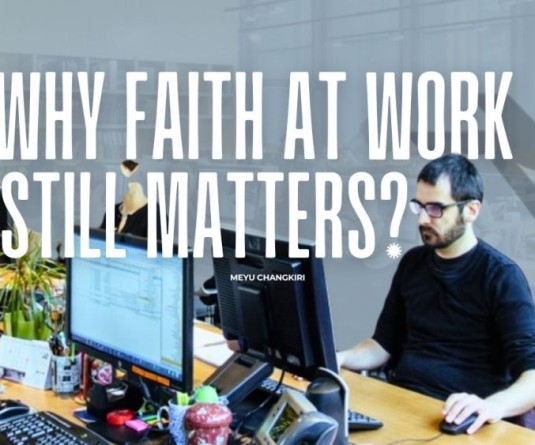
Kedo Peseyie
In the recent months there have been a lot of deliberations and verdicts on the issue of Sunday as a day of rest especially relating to economic activities. It is not the purpose of this article to give more views and thus create more confusion in the process. But as a Christian I feel a little uncomfortable when there is too much emphasis on Sunday as a day of worship. We are so concerned about observing Sunday with all religious piety and fervour, which is indeed encouraging. But wait a minute. Isn’t this typical of Naga Christianity? Why aren’t we talking about the other six days of the week? In my opinion, it is what we do and how we behave in the other six days which determines whether we really honour God on Sunday. The fact that our churches keep harping on the importance of Sunday, and their silence on the other six days is what alarms me more than the fact that certain people from other faiths refuse to honour our religious sentiments.
Let’s get this straight. The church is not for good people. It is for bad people like you and me, and bad people in the jungles and in the streets where common people dwell. It is for people in the market place who speak vulgar language. It is for young people who prefer to come out only at night. It is for the Samaritan woman who had five husbands. It is for the woman caught in adultery. It is also for the person who goes to office five days a week, and for the confused teenager in the college. But we have simply created a system where well dressed people come to church on Sundays to listen to sermons, sing hymns, and on the other week days they have no clue if the Bible has any relevance to their work and study. George MacLeod powerfully drives the point home: “I simply argue that the cross be raised again at the centre of the market place as well as on the steeple of the church. I am recovering the claim that Jesus was not crucified in a cathedral between two candles, but on a cross between two thieves; on the town garbage heap; at a crossroad so cosmopolitan that they had to write his title in Hebrew and in Latin and in Greek…at the kind of place where cynics talk smut, and thieves curse, and soldiers gamble. Because that is where he died. And that is what he died about. And that is where churchmen should be and what churchmen should be about.”
In my encounter with students on campus six days a week, I often see a lot of discrepancies between church behaviour and college behaviour. This is what our church system has created, and sadly, many of them will carry on these discrepancies when they enter a Government office or a business. I often challenge them saying, “If you cannot be a Christian in the college, don’t be a Christian in the church.” Some may say that is too hard on young people but I believe that is what we need. If we cannot live our lives meaningfully and exemplarily in the other six days, then let us also not harp on the importance of Sunday by bringing out all the theological implications. By “us” I don’t mean only the pastors and people in “fulltime” Christian ministry, but every individual who is a member of a church.
It is important that we seek to develop an action plan for the other six days of the week. Our faith should define our behaviours, actions and thoughts each day. We believe in the Christian creed and that it points us to eternity. But eternity has obligations too. And many times we fail to realise that these obligations are the ones we face everyday in our work place, our school and in our homes.
How then shall we live?
It is not the duty of the church to instruct a worker how his work should be done. He knows best how it should be done. But it is the duty of the church to lay down some Biblical principles each believer can follow as he or she seeks to make a difference in the workplace.
In the Old Testament we find that the offices of the prophets, priests and kings were the most important ones. They had prophets, they had priests and they had kings. But no individual character held these offices together. Jesus was the only one who was called the prophet, the priest and the king. We who are called to partake of the privileges, blessings and responsibilities along with Jesus can also share in the roles of the prophets, priests and kings as we seek to do our daily work wherever we are placed.
We are sent by Jesus into the world to continue his work. We can be the prophet speaking the truth, admonishing people who are in the wrong and standing up for what is righteous. We can be the priest communicating God’s presence, acknowledging the omnipresence of God, and bringing people before God in works of evangelism. We can be the king extending the rule of God to all creation and making sure that people are governed in righteousness, truth, peace and justice.
Let me give you a more elaborate description of these roles as given by R. Paul Stevens.
What do prophets do? Their work is:
• Discerning
• Communicating
• Exposing
• Seeing that justice is done
• Revealing outcomes
• Studying to guard against errors
What do priests do? Their work is:
• Bridge building
• Mediating
• Expressing meaning
• Evoking faith in others
• Blessing
• Bringing grace and forgiveness
What do kings do? Their work is:
• Ruling justly
• Organising
• Planning
• Providing
• Nurturing
• Integrating
• Settling arguments
• Solving problems
• Co-ordinating
These are roles we play not only in the churches, but more in the so-called “secular” workplaces, market places, colleges etc. If we are honest to ourselves, we will surely find that all the problems we face in our workplace arise because someone has failed to fulfil these roles given above. And very often we also find that that person is us.
Jesus was the prophet, the priest and the king when he walked the streets of Galilee exposing the Pharisees and communicating the Kingdom of God, when he entered into the temple and confronted the authorities, when he went to the home of Zacchaeus to befriend him, when he forgave the women caught in adultery, when he went to the wedding feast and provided the wine, when he wept with Mary and Martha, when he offered his own blood for us, and when he rose again from the dead and exalted in glory. And here is one of the most amazing words of Jesus: “I tell you the truth, anyone who has faith in me will do what I have been doing. He will do even greater things than these…” (John 14: 12).
To all the prophets, priests and kings out there in the other six days, keep going because we have this wonderful promise.





